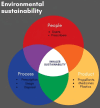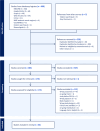Inhaler sustainability in asthma and COPD care: a systematic review
- PMID: 40713041
- PMCID: PMC12306229
- DOI: 10.1136/bmjopen-2024-098052
Inhaler sustainability in asthma and COPD care: a systematic review
Abstract
Objective: To evaluate inhaler sustainability in asthma and Chronic Obstructive Pulmomary Disease (COPD) by analysing how inhaler design typology, prescribing and usage patterns, disposal and recycling practices influence human health and environmental outcomes, using a People-Process-Product (PPP) framework to identify actionable opportunities for improvement.
Design: A systematic review was conducted in May 2024, with reporting structured around the PPP framework using narrative synthesis.
Data sources: MEDLINE, Scopus, Cochrane Library and relevant grey literature were searched for publications over the period from April 2014 to April 2024.
Eligibility criteria: Studies were included if published between 2014 and 2024, involved patients with asthma or COPD and healthcare professionals and specifically examined aspects of inhaler sustainability, including patient behaviours, healthcare provider prescribing practices and environmental impacts.
Data extraction and synthesis: Two independent reviewers screened and extracted data from 63 studies. Due to diverse methodologies, quality assessment focused on research design robustness, completeness of outcome reporting and potential biases. Findings were synthesised narratively to address each research question using the PPP framework.
Results: 33% of included studies focused on two or more domains of the PPP framework as both primary and/or secondary outcomes. Studies mapped to the 'People' domain (n=34) showed limited awareness among patients and clinicians regarding the environmental impact of inhaler prescription patterns, use patterns and disposal methods, with over 75% of patients discarding inhalers in household waste. In the 'Process' domain (n=11), switching from pressurised metered-dose inhalers (pMDIs) to dry powder inhalers (DPIs) or soft mist inhalers (SMIs) was associated with improved inhaler adherence and asthma control, though uptake of new inhalers was influenced by patients' prior experience, competence, proficiency and perceived usability. The 'Product' domain (n=41) showed that DPIs and SMIs consistently had lower carbon footprints than pMDIs, with short-acting beta-agonists (SABAs) pMDIs having the highest emissions due to prescription, use patterns and disposal.
Conclusions: Improving patient education on sustainable inhaler use and disposal and providing healthcare professionals with focused training on low-carbon prescribing are critical steps towards achieving significant clinical benefits and supporting environmental sustainability in asthma and COPD management.
Prospero registration number: CRD42024541927.
Keywords: Asthma; PUBLIC HEALTH; Systematic Review.
© Author(s) (or their employer(s)) 2025. Re-use permitted under CC BY. Published by BMJ Group.
Conflict of interest statement
Competing interests: A grant from GSK partially funds AAO's role. All other authors have no competing interests to declare.
Figures




References
-
- Bell J, Ding B, De Nigris E, et al. Greenhouse gas emissions associated with copd care in the uk: results from sherlock carbon. ERS International Congress 2021 Abstracts. 2021 doi: 10.1183/13993003.congress-2021.PA3551. - DOI
-
- Woodcock A, Rees J, Leather D, et al. Change from mdi to dpi in asthma: effects on climate emissions and disease control. ERS International Congress 2021 Abstracts. 2021 doi: 10.1183/13993003.congress-2021.PA3400. - DOI
-
- NHS England and NHS Improvement Delivering a ‘Net Zero’ National Health Service. 2020. https://www.england.nhs.uk/greenernhs/a-net-zero-nhs/ Available.
Publication types
MeSH terms
LinkOut - more resources
Full Text Sources
Medical
Miscellaneous
